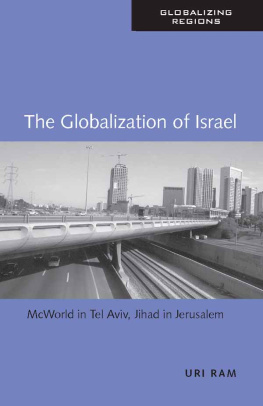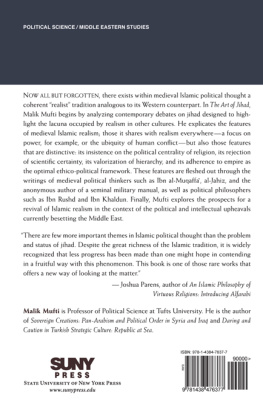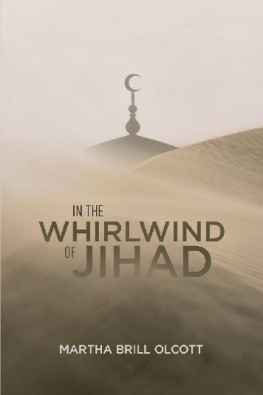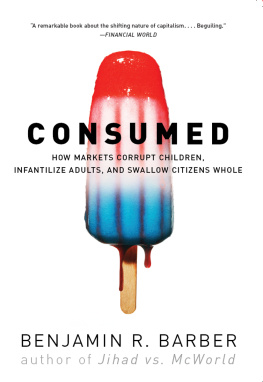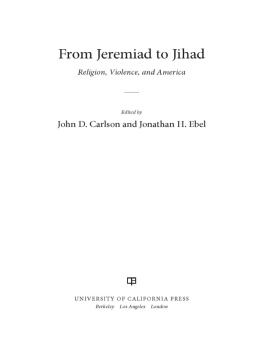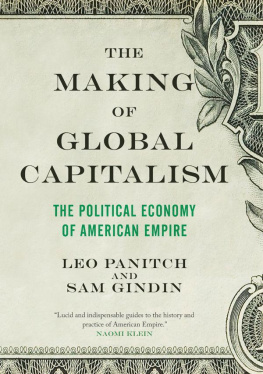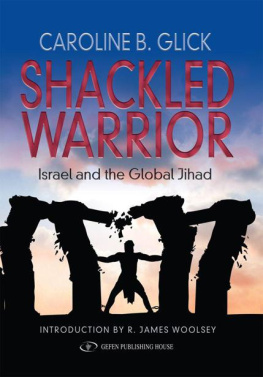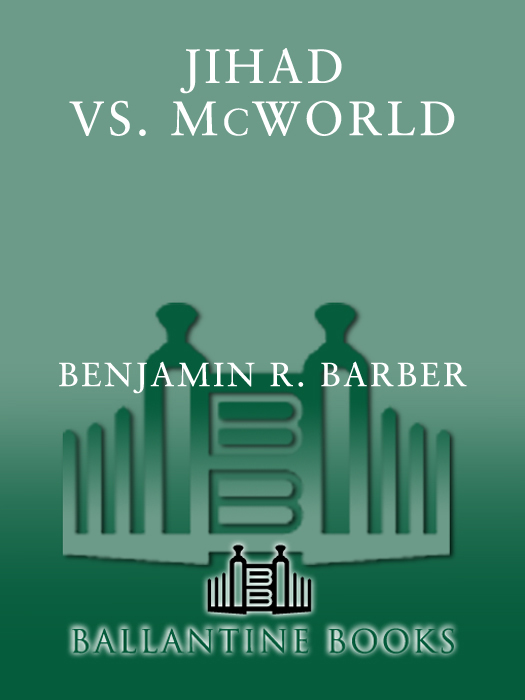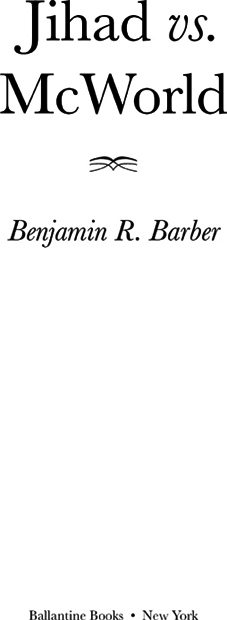McWorld is the universe of manufactured needs, mass consumption, and mass infotainment. It is motivated by profits and driven by the aggregate preferences of billions of consumers. Jihad is shorthand for the fierce politics of religious, tribal, and other zealots. In its most extreme manifestationsin the ultra nationalism of Vladimir Zhirinovskys Russia, for example, or the balkanization of the Balkansit counters McWorlds centrifugal pull and bloodless calculation.
Although some countries or parts of countries fit into one or the other category, Jihad and McWorld are not so much places as reactions to experience and attitudes of mind. As Mr. Barber provocatively puts it: Belonging by default to McWorld, everyone is a consumer; seeking a repository for identity, everyone belongs to some tribe. But no one is a citizen.
The Economist
Jihad vs. McWorld is that rare phenomenona book that is immensely readable, yet with a serious theme.
Government & Opposition
Challenging and instructive.
San Francisco Chronicle
Stimulating, tartly written.
Publishers Weekly
A BOOKLISTEDITORS CHOICE
BOOKS BY BENJAMIN R. BARBER
The Truth of Power (2001)
A Passion for Democracy (1998)
A Place for Us (1998)
Jihad vs. McWorld (1995)
An Aristocracy of Everyone (1992)
The Conquest of Politics (1988)
Strong Democracy (1984)
Marriage Voices (A Novel) (1981)
Liberating Feminism (1975)
The Death of Communal Liberty (1974)
Superman and Common Men (1971)
COLLABORATIONS
The Struggle for Democracy
with Patrick Watson (1989)
The Artist and Political Vision
edited with M. McGrath (1982)
Totalitarianism in Perspective
with C. J. Friedrich and M. Curtis (1969)
To the Memory of Judith N. Shklar
Acknowledgments
I was given extraordinary support by two research assistants. Carolyn Nestor did extensive work preparing the empirical materials for the chapters on McWorld, and also reviewed and corrected the notes and bibliographic materials on a crash schedule whose deadlines she met with remarkable aplomb. She acted as a sounding board for ideas and contributed far more than would be expected from a research assistant. I am very much in her debt. Mark Button helped develop research materials, theoretic and empirical, for the Jihad chapters, and was particularly astute in getting to the heart of alternative historical readings. Although the errors remain my own doing, the work of Nestor and Button saved me from what I know would have been many more.
Kathleen Quinn gave the finished manuscript several ruthless readings and readers owe her much for whatever fluency and continuity the text now has. Had she had her way, the book would have been even shorter and more readable, but someone had to take a stand for prolixity and I managed in the end to ignore rather too many of her sound editorial judgments.
Steve Wasserman at Times Books called me in Paris not long after my article on Jihad and McWorld appeared in The Atlantic and initiated a process of persuasion and discussion that led to this book. I am grateful to him for his enthusiasm and commitment, without which I would not have written the book. The same can be said of my old friend at The Atlantic, Jack Beatty, who encouraged me in developing a provocative idea into a sustainable argument.
Many friends, colleagues, associates, and anonymous commentatorsboth in the United States and abroadhave responded to the original Atlantic article, scholarly and popular presentations of the argument as it developed, and sections of the manuscript as it was being written. I feel lucky to have had so many astute critics who were also friends, among them Michael Kustow, Franois DAlancon, Bhikhu Parekh, Ivan Vitanyi, Jean Leca, Preston King, Michael Greven, Bruce Ackerman, Ghita Ionescu, Brian Barry, Chantal Mouffe, George Kateb, Nina Belyaeva, Harry Boyte, Richard Lehne, Seyla Benhabib, Alan Ryan, and the consummate scholar and dear friend to whom the book is dedicated, Judith N. Shklarwho feared Jihad, distrusted McWorld, and, ever so carefully, worked to clear a space for freedom and democracy.
Had I heeded these friendly critics more consistently, I would have certainly written a better book.
To my wife Leah and my daughter Nellie I owe an apology, though they have asked none of me. Without the labors of this project, I would have been better able to repay their indulgent tolerance. The guilt I feel arises not from complaint, but from how much too lovingly understanding they have been.
Contents
Appendix B. Twenty-two Countries Top Ten Grossing Films,
1991
2001 Introduction
Terrorisms Challenge to Democracy
O N SEPTEMBER 11 , Jihads long war against McWorld culminated in a fearsomely unprecedented and altogether astonishing assault on the temple of free enterprise in New York City and the cathedral of American military might in Washington, D.C. In bringing down the twin towers of the World Trade Center and destroying a section of the Pentagon with diabolically contrived human bombs, Jihadic warriors reversed the momentum in the struggle between Jihad and McWorld, writing a new page in an ongoing story. Until that day, historys seemingly ineluctable march into a complacent postmodernity had appeared to favor McWorlds ultimate triumpha historical victory for free-market institutions and McWorlds assiduously commercialized and ambitiously secularist materialism. Today, the outcome of the confrontation between the future and the radical reaction to it seems far less certain. As the world enters a novel stage of shadowed warfare against an invisible enemy, the clash between Jihad and McWorld is again poignantly relevant in understanding why the modern response to terror cannot be exclusively military or tactical, but rather must entail a commitment to democracy and justice even when they are in tension with the commitment to cultural expansionism and global markets. The war against terrorism also will have to be a war for justice if it is to succeed, and not just in the sense in which President George W. Bush used the term in his address to Congress.
A week after the trauma of the first large-scale assault on the American homeland, more successful than even its scheming perpetrators could possibly have hoped for, the president joined the abruptly renewed combat with Jihadic terrorists by deploying the rhetoric of retributive justice: We will bring the terrorists to justice, he said gravely to a joint session of Congress, or we will bring justice to the terrorists. The language of justice was surely the appropriate context for the American response, but it will remain appropriate only if the compass of its meaning is extended from retributive to distributive justice.
The collision between the forces of disintegral tribalism and reactionary fundamentalism I have called Jihad (Islam is not the issue) and the forces of integrative modernization and aggressive economic and cultural globalization I have called McWorld (for which America is not solely responsible) has been brutally exacerbated by the dialectical interdependence of these two seemingly oppositional sets of forces. In


